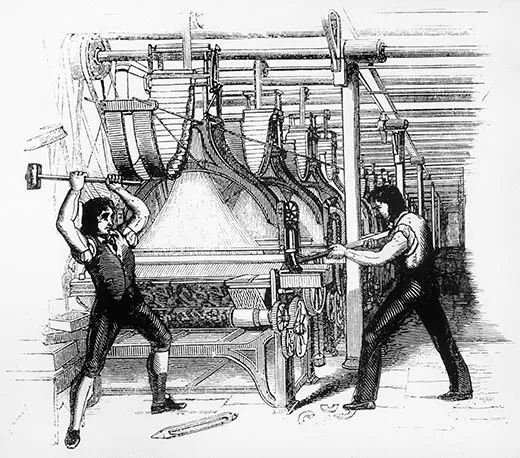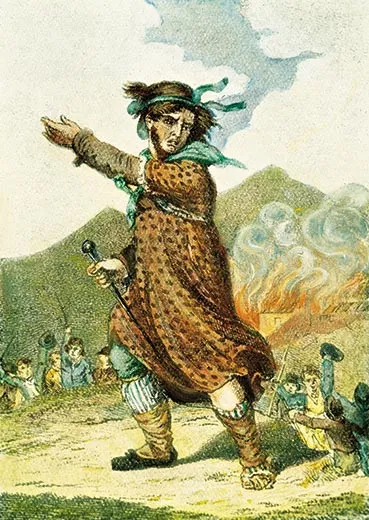Mẹo The luddites were threatened by industrialization of what industry in particular?
Kinh Nghiệm về The luddites were threatened by industrialization of what industry in particular? Mới Nhất
Lê Mạnh Hùng đang tìm kiếm từ khóa The luddites were threatened by industrialization of what industry in particular? được Update vào lúc : 2022-11-29 08:56:06 . Với phương châm chia sẻ Bí kíp Hướng dẫn trong nội dung bài viết một cách Chi Tiết 2022. Nếu sau khi tham khảo tài liệu vẫn ko hiểu thì hoàn toàn có thể lại phản hồi ở cuối bài để Tác giả lý giải và hướng dẫn lại nha.
What economic advantages did Britain enjoy in the 18th century?
Nội dung chính Show- What specifically did the Luddites oppose about industrialization?What did the Luddites fight against?What is a Luddite industrial revolution?Which industrial towns were targeted by Luddites?
(3)
Abundant and accessible coal deposits,
Access to water transportation,
Sources of capital for investment.
Cotton cloth was valued by European consumers in the 18th century because it:
was comfortable and convenient.
Improvements in transportation, such as railroads and steamships,
(4)
Lowered transportation costs,
Linked industrial centers with overseas resources,
Facilitated the movement of people as well as goods,
Facilitated delivery of manufactured products to consumers.
What were some significant labor-saving inventions in the production of cotton cloth?
(4)
The flying shuttle,
The steam-driven spinning mule,
The power loom,
The cotton gin.
From the perspective of the worker, the factory system meant:
harsh discipline and close supervision.
From the perspective of the consumer, the factory system meant:
cheaper manufactured goods.
Rural laborers new tot he factory had difficulty adjusting to the:
rigid timetables of industrial work.
The Luddites were threatened by industrialization of what industry in particular?
The British maintained their head start in industrialization:
by forbidding the export of machinery and expertise.
Which government gave the most workers' rights, pensions, and social security than other industrializing nations of the late 19th century?
One advantage of the industrial corporation over the joint-stock company was the:
limited liability for investors.
What are some examples of vertical organization?
(3)
Standard Oil's control of all phases of petroleum production and distribution,
The Krupp firm's integration of mines, steel mills, and munitions plants,
US Steel's control of mines, steel mills, and railroad manufacture.
The population of the industrial world grew dramatically in the 19th century, in part because:
improved transportation networks resulted in cheaper food and therefore better diets.
By 1900, birthrates had sharply declined in most industrialized countries because:
(4)
Raising children was more expensive in an industrial society than in an agricultural one,
Declining infant mortality meant that more of the children born were likely to survive,
Improved health and nutrition improved overall death rates,
Married couples actively practiced birth control.
What was typical inducement for Europeans to emigrate abroad in the 19th century?
Famine in Ireland,
Difficult political, social, and economic circumstances in Europe generally,
Anti-Semitism in Russia,
Economic opportunities in the United States.
Middle-class family life in the new industrial society was characterized by:
gender division of labor and space.
In Britain, one outcome of the laws against child labor in the late 19th century was that:
all children were required to attend public school.
In their critique of industrial capitalism, Karl Marx and Friedrich Engels claimed that:
only a communist revolution would overcome the abuses of capitalism and create a just and equal society.
In response to socialist demands for social and economic reform, most governments:
(4)
treated unions as illegal organizations,
Supported business and prosecuted strikers,
Passed laws restricting child labor,
Extended the vote to the working class.
Social reforms enacted by Germany in the late 19th century included:
(4)
Retirement pensions,
Minimum wage,
Unemployment insurance,
Medial insurance.
/https://tf-cmsv2-smithsonianmag-media.s3.amazonaws.com/filer/presence-King-Ludd-631.jpg) Ludd, drawn here in 1812, was the fictitious leader of numerous real protests. Granger Collection, Tp New York
Ludd, drawn here in 1812, was the fictitious leader of numerous real protests. Granger Collection, Tp New YorkIn an essay in 1984— the dawn of the personal computer era—the novelist Thomas Pynchon wondered if it was “O.K. to be a Luddite,” meaning someone who opposes technological progress. A better question today is whether it’s even possible. Technology is everywhere, and a recent headline an Internet hu-mor site perfectly captured how difficult it is to resist: “Luddite invents machine to destroy technology quicker.”
Like all good satire, the mock headline comes perilously close to the truth. Modern Luddites do indeed invent “machines”—in the form of computer viruses, cyberworms and other malware—to disrupt the technologies that trouble them. (Recent targets of suspected sabotage include the London Stock Exchange and a nuclear power plant in Iran.) Even off-the-grid extremists find technology irresistible. The Unabomber, Ted Kaczynski, attacked what he called the “industrial-technological system” with increasingly sophisticated mail bombs. Likewise, the cave-dwelling terrorist sometimes derided as “Osama bin Luddite” hijacked aviation technology to bring down skyscrapers.
For the rest of us, our uneasy protests against technology almost inevitably take technological form. We worry about whether violent computer games are warping our children, then decry them by tweet, text or Meta post. We try to simplify our lives by shopping the local farmers market—then haul our organic arugula home in a Prius. College students take out their earbuds to discuss how technology dominates their lives. But when a class ends, Loyola University of Chicago professor Steven E. Jones notes, their cellphones all come to life, screens glowing in front of their faces, “and they migrate across the lawns like giant schools of cyborg jellyfish.”
That’s when he turns on his phone, too.
The word “Luddite,” handed down from a British industrial protest that began 200 years ago this month, turns up in our daily language in ways that suggest we’re confused not just about technology, but also about who the original Luddites were and what being a modern one actually means.
Blogger Amanda Cobra, for instance, worries about being “a drinking Luddite” because she hasn’t yet mastered “infused” drinks. (Sorry, Amanda, real Luddites were clueless when it came to steeping vanilla beans in vodka. They drank—and sang about—“good ale that’s brown.”) And on , Wolfwhistle Amy thinks she’s a Luddite because she “cannot giảm giá with heel heights” given in centimeters instead of inches. (Hmm. Some of the original Luddites were cross-dressers—more about that later—so maybe they would empathize.) People use the word now even to describe someone who is merely clumsy or forgetful about technology. (A British woman locked outside her house tweets her husband: “You stupid Luddite, turn on your bloody phone, i can’t get in!”)
The word “Luddite” is simultaneously a declaration of ineptitude and a badge of honor. So you can hurl Luddite curses your cellphone or your spouse, but you can also sip a wine named Luddite (which has its own Web site: www.luddite.co.za). You can buy a guitar named the Super Luddite, which is electric and costs $7,400. Meanwhile, back , SupermanHotMale Tim is understandably puzzled; he grunts to ninatypewriter, “What is Luddite?”
Almost certainly not what you think, Tim.
Despite their modern reputation, the original Luddites were neither opposed to technology nor inept using it. Many were highly skilled machine operators in the textile industry. Nor was the technology they attacked particularly new. Moreover, the idea of smashing machines as a form of industrial protest did not begin or end with them. In truth, the secret of their enduring reputation depends less on what they did than on the name under which they did it. You could say they were good branding.
The Luddite disturbances started in circumstances least superficially similar to our own. British working families the start of the 19th century were enduring economic upheaval and widespread unemployment. A seemingly endless war against Napoleon’s France had brought “the hard pinch of poverty,” wrote Yorkshire historian Frank Peel, to homes “where it had hitherto been a stranger.” Food was scarce and rapidly becoming more costly. Then, on March 11, 1811, in Nottingham, a textile manufacturing center, British troops broke up a crowd of protesters demanding more work and better wages.
That night, angry workers smashed textile machinery in a nearby village. Similar attacks occurred nightly first, then sporadically, and then in waves, eventually spreading across a 70-mile swath of northern England from Loughborough in the south to Wakefield in the north. Fearing a national movement, the government soon positioned thousands of soldiers to defend factories. Parliament passed a measure to make machine-breaking a capital offense.
But the Luddites were neither as organized nor as dangerous as authorities believed. They set some factories on fire, but mainly they confined themselves to breaking machines. In truth, they inflicted less violence than they encountered. In one of the bloodiest incidents, in April 1812, some 2,000 protesters mobbed a mill near Manchester. The owner ordered his men to fire into the crowd, killing least 3 and wounding 18. Soldiers killed least 5 more the next day.
Earlier that month, a crowd of about 150 protesters had exchanged gunfire with the defenders of a mill in Yorkshire, and two Luddites died. Soon, Luddites there retaliated by killing a mill owner, who in the thick of the protests had supposedly boasted that he would ride up to his britches in Luddite blood. Three Luddites were hanged for the murder; other courts, often under political pressure, sent many more to the gallows or to exile in Australia before the last such disturbance, in 1816.
One technology the Luddites commonly attacked was the stocking frame, a knitting machine first developed more than 200 years earlier by an Englishman named William Lee. Right from the start, concern that it would displace traditional hand-knitters had led Queen Elizabeth I to deny Lee a patent. Lee’s invention, with gradual improvements, helped the textile industry grow—and created many new jobs. But labor disputes caused sporadic outbreaks of violent resistance. Episodes of machine-breaking occurred in Britain from the 1760s onward, and in France during the 1789 revolution.
As the Industrial Revolution began, workers naturally worried about being displaced by increasingly efficient machines. But the Luddites themselves “were totally fine with machines,” says Kevin Binfield, editor of the 2004 collection Writings of the Luddites. They confined their attacks to manufacturers who used machines in what they called “a fraudulent and deceitful manner” to get around standard labor practices. “They just wanted machines that made high-quality goods,” says Binfield, “and they wanted these machines to be run by workers who had gone through an apprenticeship and got paid decent wages. Those were their only concerns.”
So if the Luddites weren’t attacking the technological foundations of industry, what made them so frightening to manufacturers? And what makes them so memorable even now? Credit on both counts goes largely to a phantom.
Ned Ludd, also known as Captain, General or even King Ludd, first turned up as part of a Nottingham protest in November 1811, and was soon on the move from one industrial center to the next. This elusive leader clearly inspired the protesters. And his apparent command of unseen armies, drilling by night, also spooked the forces of law and order. Government agents made finding him a consuming goal. In one case, a militiaman reported spotting the dreaded general with “a pike in his hand, like a serjeant’s halbert,” and a face that was a ghostly unnatural white.
In fact, no such person existed. Ludd was a fiction concocted from an incident that supposedly had taken place 22 years earlier in the city of Leicester. According to the story, a young apprentice named Ludd or Ludham was working a stocking frame when a superior admonished him for knitting too loosely. Ordered to “square his needles,” the enraged apprentice instead grabbed a hammer and flattened the entire mechanism. The story eventually made its way to Nottingham, where protesters turned Ned Ludd into their symbolic leader.
The Luddites, as they soon became known, were dead serious about their protests. But they were also making fun, dispatching officious-sounding letters that began, “Whereas by the Charter”...and ended “Ned Lud’s Office, Sherwood Forest.” Invoking the sly banditry of Nottinghamshire’s own Robin Hood suited their sense of social justice. The taunting, world-turned-upside-down character of their protests also led them to march in women’s clothes as “General Ludd’s wives.”
They did not invent a machine to destroy technology, but they knew how to use one. In Yorkshire, they attacked frames with massive sledgehammers they called “Great Enoch,” after a local blacksmith who had manufactured both the hammers and many of the machines they intended to destroy. “Enoch made them,” they declared, “Enoch shall break them.”
This knack for expressing anger with style and even swagger gave their cause a personality. Luddism stuck in the collective memory because it seemed larger than life. And their timing was right, coming the start of what the Scottish essayist Thomas Carlyle later called “a mechanical age.”
People of the time recognized all the astonishing new benefits the Industrial Revolution conferred, but they also worried, as Carlyle put it in 1829, that technology was causing a “mighty change” in their “modes of thought and feeling. Men are grown mechanical in head and in heart, as well as in hand.” Over time, worry about that kind of change led people to transform the original Luddites into the heroic defenders of a pretechnological way of life. “The indignation of nineteenth-century producers,” the historian Edward Tenner has written, “has yielded to “the irritation of late-twentieth-century consumers.”
The original Luddites lived in an era of “reassuringly clear-cut targets—machines one could still destroy with a sledgehammer,” Loyola’s Jones writes in his 2006 book Against Technology, making them easy to romanticize. By contrast, our technology is as nebulous as “the cloud,” that Web-based limbo where our digital thoughts increasingly go to spend eternity. It’s as liquid as the chemical contaminants our infants suck down with their mothers’ milk and as ubiquitous as the genetically modified crops in our gas tanks and on our dinner plates. Technology is everywhere, knows all our thoughts and, in the words of the technology utopian Kevin Kelly, is even “a divine phenomenon that is a reflection of God.” Who are we to resist?
The original Luddites would answer that we are human. Getting past the myth and seeing their protest more clearly is a reminder that it’s possible to live well with technology—but only if we continually question the ways it shapes our lives. It’s about small things, like now and then cutting the cord, shutting down the smartphone and going out for a walk. But it needs to be about big things, too, like standing up against technologies that put money or convenience above other human values. If we don’t want to become, as Carlyle warned, “mechanical in head and in heart,” it may help, every now and then, to ask which of our modern machines General and Eliza Ludd would choose to break. And which they would use to break them.
Richard Conniff, a frequent contributor to Smithsonian, is the author, most recently, of The Species Seekers.

/
The Luddites, shown here hammering away in a textile mill in 1812, were not the first protesters to smash technology. And many were skilled using machines. Tom Morgan / Mary Evans Picture Library

/
Ludd, drawn here in 1812, was the fictitious leader of numerous real protests. Granger Collection, Tp New York

/
Unabomber Ted Kaczynski, shown here in a 1994 FBI sketch, reflected latter-day Luddism when he targeted the "industrial-technological system" for his attacks. FBI / AP Images British History Industrial Revolution Movement LeadersRecommended Videos
What specifically did the Luddites oppose about industrialization?
The original Luddites were British weavers and textile workers who objected to the increased use of mechanized looms and knitting frames. Most were trained artisans who had spent years learning their craft, and they feared that unskilled machine operators were robbing them of their livelihood.What did the Luddites fight against?
The Luddites have been described as people violently opposed to technological change and the riots put down to the introduction of new machinery in the wool industry. Luddites were protesting against changes they thought would make their lives much worse, changes that were part of a new market system.What is a Luddite industrial revolution?
Definition of Luddites Luddites were textile workers during the Industrial Revolution in Great Britain. They protested the introduction of machines that threatened to make their jobs obsolete. The term 'luddite' continues to be used today and refers to someone who is opposed to new technology.Which industrial towns were targeted by Luddites?
The Luddites met night on the moors surrounding industrial towns to practice military-like drills and manoeuvres. Their main areas of operation began in Nottinghamshire in November 1811, followed by the West Riding of Yorkshire in early 1812, and then Lancashire by March 1813. Tải thêm tài liệu liên quan đến nội dung bài viết The luddites were threatened by industrialization of what industry in particular? Neo luddite Luddite là gì
Post a Comment